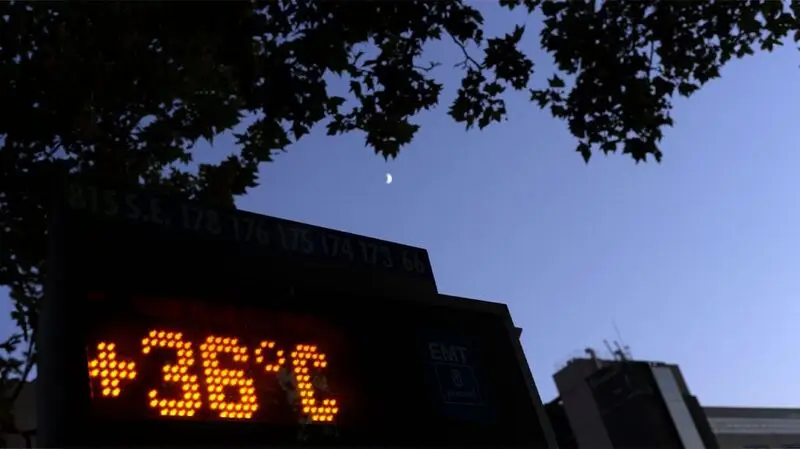
- Older people, especially women, were found to be at an increased risk of stroke on hot nights in a new study.
- Heat can disrupt the functioning of the cardiovascular system, acting as a profound stressor and even affecting how blood vessels contract and dilate.
- To reduce the risk of stroke on hot nights, drink plenty of water, keep air circulating, and utilize cool showers and baths, as well as cool clothes on the forehead and torso.
- The research cites nocturnal heat as a critical trigger of stroke events in a warming climate.
A new study investigates one way that the warming of our planet may adversely affect human health.
The authors of the study found a 7% higher risk of strokes on warm nights, particularly among elderly women.
The average temperature for both land and ocean surfaces between 2011 and 2020 signaled the warmest decade globally on record, surpassing the previous decade’s benchmark set in 2001 to 2010.
The study’s authors suggest that as climate change progresses, it is becoming increasingly urgent to understand its ramifications on human well-being.
For the new study, researchers analyzed patient data from Augsburg Hospital in Germany over a 15-year period. They found 11,037 strokes had been diagnosed between 2006 and 2020, from May to October, the months of greatest warmth. The average age of stroke patients was 71.3.
The most common type of stroke recorded in the study was ischemic strokes, with 7,430 incidents. There were also 642 hemorrhagic strokes and 2,947 transient ischemic attacks. Most of the strokes included in the study were considered minor or moderate-severity strokes (85%).
An ischemic stroke occurs when a blood vessel becomes blocked. Hemorrhagic strokes occur when a blood vessel ruptures or tears open. “Warning strokes,” or transient ischemic attacks, are temporary blood vessel blockages that mimic a stroke but do not lead to the permanent symptoms.
To assess the association of strokes with hotter nights, the researchers analyzed data from a local meteorological station that captured conditions by the hour, including temperature, relative humidity, and barometric pressure. They also controlled for daytime temperature to reduce its effects on nighttime stroke events.
The researchers observed a slight increase in the number of hot-night strokes from 2013 to 2020 compared to 2006 to 2012, a period of time when temperatures were cooler.
People who were most vulnerable to night heat were older people, particularly women, and individuals with mild stroke symptoms.
The study appears in the European Heart Journal.
“The results are concerning yet not surprising,” said cardiologist Cheng-Han Chen, MD of Saddleback Medical Center, CA. Chen was not involved in the study.
“We know from previous studies that extreme heat-elevated temperatures overall do increase cardiovascular events such as heart attack and stroke.” He noted that the study authors “use a robust statistical analysis that spanned many years, so the trend does appear significant.”
Jayne Morgan, MD, cardiologist and the Executive Director of Health and Community Education at the Piedmont Healthcare Corporation in Atlanta, GA, was somewhat more cautious regarding the study’s findings. Morgan was not involved in the study.
While Morgan agreed that since there is an association between extremely hot weather conditions and more heart attacks, it would not be surprising to find a similar correlation with strokes.
“However, causality remains absent,” she cautioned.
“Additionally, this was a very homogenous population, and it is unclear whether it can be extrapolated to the diversity of the globe,” Morgan added.
Morgan also noted that with an average age of 70 for those included in the study, it is difficult to know if the strokes were more related to age than heat or “whether the aged are simply more vulnerable, or living with more risk factors.”
“Finally, sub-analyses were not done and indeed, nearly a quarter of the population of this study had a gender that was unknown,” Morgan added.
Chen explained, “The cardiovascular system is a major part of our thermal regulation, our temperature control of our bodies. When you have extreme heat, it interferes with how well the cardiovascular system can regulate our body temperature, and that puts the system under stress.”
Morgan noted, “Dehydration from heat can put stress on the heart and body, and excessive sweating can lead to electrolyte imbalances.”
Heat also affects, said Chen, “how our blood vessels constrict and dilate, so these effects could potentially cause cardiovascular events such as heart attack and stroke.”
As a result, said Morgan, “Extreme heat is a stressor that can cause an increase in blood pressure, and may even increase blood coagulability. Plus, those with pre-existing conditions may be particularly susceptible.”
Both Chen and Morgan emphasized the importance of staying well-hydrated on hot nights and during hot days.
“That means drink plenty of water before you go to sleep,” said Chen.
He also recommended having as much circulation in one’s bedroom as possible and keeping windows open so that the moving air, even if it is warm, can help sweat evaporate. “Evaporation does help the body cool down,” Chen explained.
Morgan suggested that “cool baths and showers, and cool cloths on the neck, forehead, and torso” can help lower body temperature.
Morgan raised concerns about how climate change can be destructive to one’s cardiovascular health:
“There is concern for pollution and a rise in particulate matter, which can enter both the lungs and bloodstream, negatively impacting healthy heart tissue,” she said.





